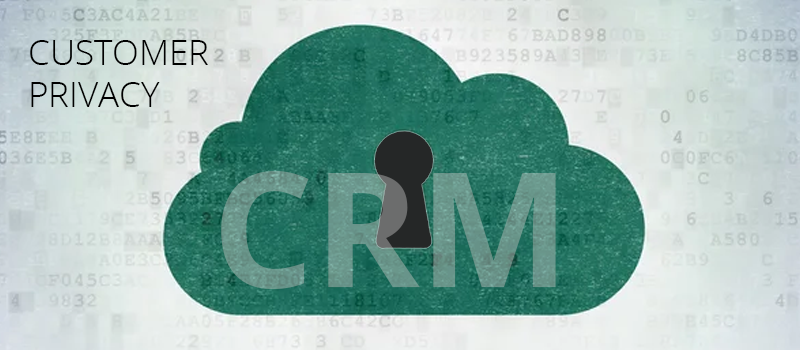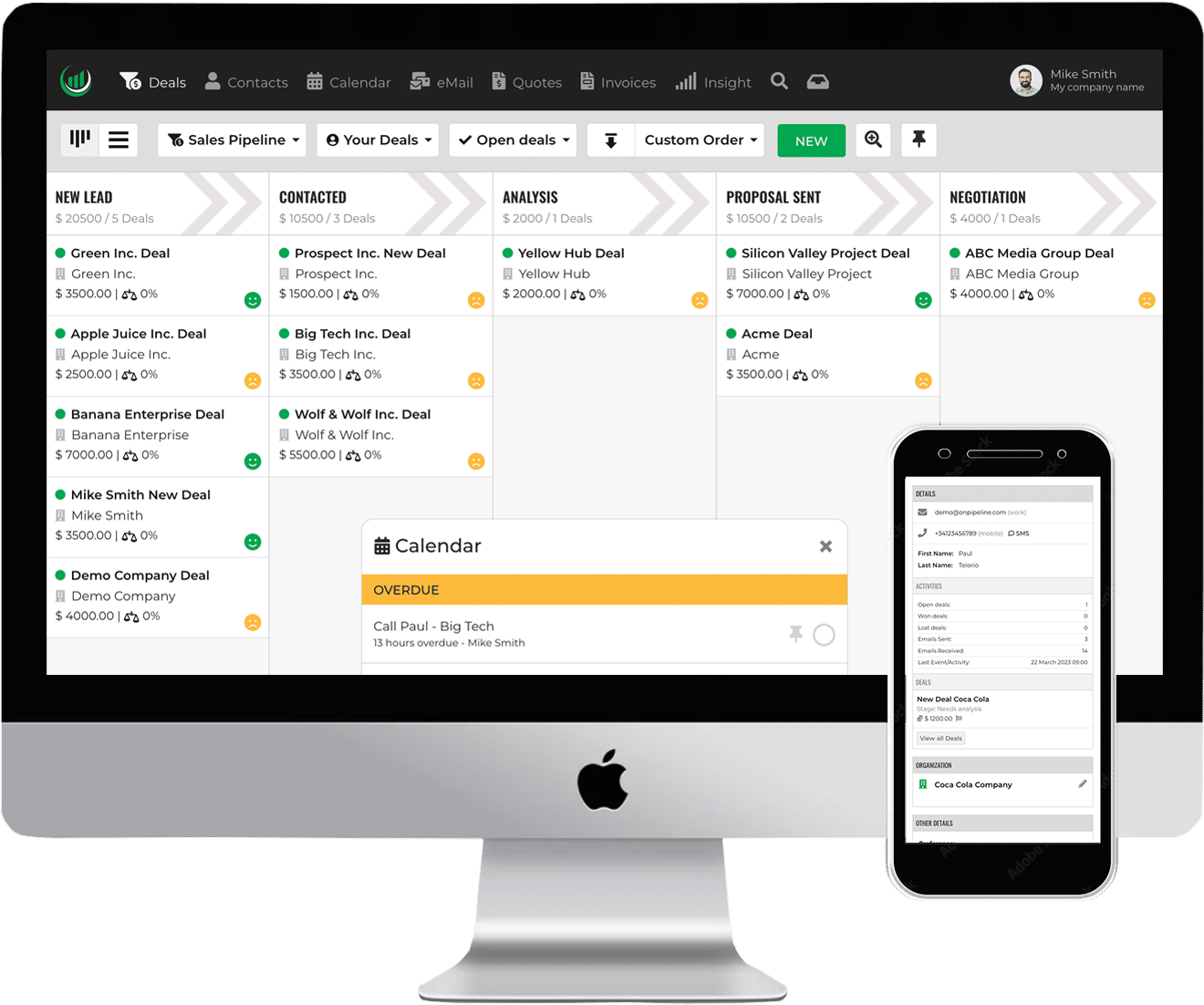Data privacy in CRM refers to the protection of sensitive information held about clients and prospects that interact with a business. This protection involves implementing measures to safeguard against unauthorized access, data breaches, and misuse of personal data.
The goal is to respect customer privacy and comply with applicable data protection laws, which vary by region and industry.
Prominent examples include the General Data Protection Regulation (GDPR) in the European Union, the Health Insurance Portability and Accountability Act (HIPAA) in the United States, and other global data protection standards.
Maintaining high standards of data privacy offers two significant benefits:
- Legal Compliance
- Building Trust
Data breaches not only lead to financial loss but can also damage a company’s reputation, erode customer trust, and result in legal consequences.
Types of data stored in CRM databases
CRMs store various types of sensitive data that are critical to business operations yet need to be protected due to their personal or confidential nature. Here are some common types of sensitive data typically stored in CRM platforms:
Personal Identifiable Information (PII)
This includes any data that can be used to identify an individual, such as names, addresses, phone numbers, email addresses, and social security numbers.
Financial Information
Details regarding customers’ credit card numbers, bank account details, payment history, and purchasing behavior.
Contact History
Records of all past communications with customers, including emails, phone calls, and chat transcripts, which may contain sensitive information discussed during those interactions.
Contract Details
Information about agreements and terms of service between the business and the customer, which may include negotiation details and pricing.
Health Information
For businesses in the healthcare sector, CRM systems might store sensitive health-related information that is protected under laws like HIPAA in the U.S.
Employment Information
For B2B companies, CRMs may contain details about an individual’s employment, such as their job title, department, and professional background.
Behavioral Data
Information on customer behavior, preferences, and interactions, which can be sensitive if linked with personal identifiers.
Sales and Marketing Data
Details of past purchases, responses to marketing campaigns, and other sales-related information that could be sensitive if mishandled.
Overview of common Data Protection Laws
Data protection laws are crucial for safeguarding personal information and ensuring organizations handle it responsibly. Here are some of the most common data protection laws:
General Data Protection Regulation (GDPR) – This law from the European Union, implemented in May 2018, is one of the strictest globally. It requires businesses to protect the personal data and privacy of EU citizens and imposes obligations on organizations anywhere, as long as they target or collect data related to people in the EU.
Health Insurance Portability and Accountability Act (HIPAA) – Established in the United States in 1996, HIPAA protects sensitive patient health information, ensuring that it can’t be disclosed without the patient’s consent or knowledge. It primarily applies to the healthcare sector.
California Consumer Privacy Act (CCPA) – Effective from January 2020, this act provides California residents with new rights regarding their personal information. It applies to any business that collects consumers’ personal data, serves California residents, and meets certain levels of revenue or data processing.
Personal Information Protection and Electronic Documents Act (PIPEDA) – This Canadian act governs how private sector organizations collect, use, and disclose personal information in commercial business. It emphasizes the necessity of obtaining individual consent for data collection and use.
Data Protection Act 2018 (DPA 2018) – The UK’s implementation of the GDPR, this act controls how personal information is used by organizations, businesses, or the government within the UK. It mirrors GDPR’s directives on processing personal data and ensuring individual rights.
Potential risks and vulnerabilities
One of the most significant risks for privacy is unauthorized access to sensitive customer data stored in CRMs. Data breaches can occur due to hacking, phishing attacks, or internal security failures, leading to the exposure of personal information.
You must employ robust cybersecurity measures in CRM such as firewalls, anti-virus software, and intrusion detection systems. Here are some potential issues to be aware of:
Unauthorized Access
Without proper access controls, employees or third parties might access sensitive data that they should not have access to. This can lead to data leaks or misuse of information.
Lack of Compliance
You must comply with various privacy and data protection regulations. Failure to update systems in line with evolving laws can result in non-compliance, leading to legal penalties and damage to reputation.
Secure data transfer and access controls
To ensure the security of data as it moves between systems and to manage who can access what data within a CRM, organizations should implement a combination of secure data transfer techniques and robust access controls.
1. Encryption
Use strong encryption protocols such as TLS (Transport Layer Security) to secure data in transit. This prevents unauthorized interception of data as it moves from one system to another.
2. VPN (Virtual Private Network)
Employ a VPN to establish a secure, encrypted tunnel through which data can be transmitted safely across public networks.
3. User Authentication
Use strong authentication mechanisms such as two-factor authentication (2FA), and strong password policies to verify the identities of users accessing the CRM tool.
4. Session Management
Implement session management controls that automatically log users out after periods of inactivity and that monitor for any unusual access patterns or multiple logins from different locations.
Training and awareness for CRM Users
Training for users is an essential component of a robust data privacy and security strategy. Educating staff on best practices, legal requirements, and potential risks associated with handling customer data can significantly mitigate the risk of data breaches and non-compliance with data protection laws.
Well-informed employees are less likely to make mistakes that can lead to data breaches. Understanding the principles of data protection and security helps them handle data responsibly.
Key Elements of CRM User Training:
- Teach users about basic data protection principles and the importance of safeguarding customer information.
- Explain the different types of sensitive data and the potential risks associated with mishandling it.
- Provide information on relevant data protection laws and the organization’s policies on data privacy.
- Educate users on the consequences of non-compliance, both for them personally and for the organization.
- Train users on the specific security practices and controls implemented in the CRM system, such as using strong passwords, recognizing phishing attempts, and securing physical and digital access to devices.
- Offer tailored training that is relevant to the specific roles and responsibilities of different users within the CRM system. For instance, sales personnel might need detailed training on how to securely process customer orders, while marketing staff may need to know how to manage campaign data responsibly.
- Educate users on how to recognize signs of a security incident and the proper steps to report these issues.
- Provide ongoing training sessions to cover new threats, updated regulations, or changes to the CRM system.
- Use assessments to measure the effectiveness of the training and gather feedback to improve future sessions.
By investing in comprehensive training programs for CRM users, organizations not only enhance their security and compliance postures but also empower their employees to act as the first line of defense against data privacy threats.


